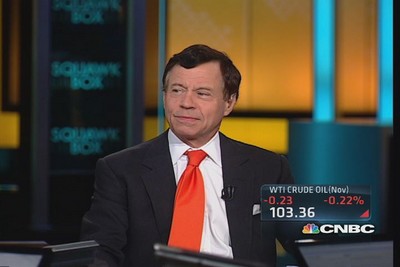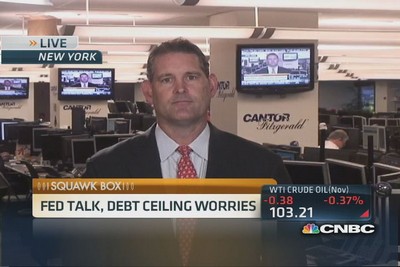Stocks gain, but Fed uncertainties remain; Russell 2000 hits record high
Stocks recovered their earlier losses in
volatile trading Tuesday, with major averages looking to halt a
three-day decline, but gains were limited as investors remained cautious
amid uncertainties surrounding central bank's stimulus program and
budget discussions in Washington.
| Name | Price | Change | %Change | ||
|---|---|---|---|---|---|
| DJIA | Dow Jones Industrial Average | 15417.15 | 15.77 | 0.10% | |
| S&P 500 | S&P 500 Index | 1705.20 | 3.36 | 0.20% | |
| NASDAQ | Nasdaq Composite Index | 3782.80 | 17.51 | 0.47% |
The Dow Jones Industrial Average recovered from its lows to trade around the flatline.
The S&P 500 traded around 1,700, while the Nasdaq toggled in and out of positive territory. The CBOE Volatility Index (VIX), widely considered the best gauge of fear in the market, traded near 14.
Meanwhile, the Russell 2000 index crept higher to hit an all-time high. Small-cap stocks have led for most of the year, surging nearly 27 percent.
Among key S&P sectors, industrials led the gainers, while telecoms lagged.
The S&P 500 traded around 1,700, while the Nasdaq toggled in and out of positive territory. The CBOE Volatility Index (VIX), widely considered the best gauge of fear in the market, traded near 14.
Meanwhile, the Russell 2000 index crept higher to hit an all-time high. Small-cap stocks have led for most of the year, surging nearly 27 percent.
Among key S&P sectors, industrials led the gainers, while telecoms lagged.
Home prices climbed 0.6 percent in July,
according to the S&P/Case-Shiller composite index of 20 metropolitan
areas. Compared to a year earlier, prices were up 12.4 percent,
matching economists' expectations and marking the strongest rise since February 2006.
Forget easing prices, new homes are up, up, up)
"The recovery in housing has been an important source of support for the U.S. economy, with residential investment adding to real GDP (gross domestic product) growth for eight consecutive quarters," said Barclays analysts Hamish Pepper and Cagdas Aksu in a note on Monday.
Meanwhile, the consumer confidence index declined slightly in September to 79.7 from a revised 81.8 in August, according to the Conference Board. Economists polled by Reuters expected a reading of 79.9.
In a busy week for speeches by Fed officials, New York Fed President William Dudley and Atlanta Fed President Dennis Lockhart took a dovish tone at the start of the week. Dudley said he supported the Fed's surprise decision to delay scaling back its monthly $85 billion bond-buying program, given the lack of momentum in the U.S. economy.
Dallas Fed President Richard Fisher, however, was more hawkish, indicating that he would have opposed Stocks rudderless as DC agenda dominates)
On Tuesday, investors will eye comments from Kansas City Fed President Esther George, who is due to speak at 12:30 p.m. ET. Last week, she said the Federal Reserve created confusion in the market with its lack of decision to taper. Cleveland Fed President Sandra Pianalto is also scheduled to make a speech on Tuesday.
Investec analyst described the "Fed flustering" as a "very bad one-sided baseball game."
"Bernanke threw a massive curveball with a surprise no taper on Wednesday saying any scale back would be data dependent," the analysts wrote in a note on Tuesday. "(On Monday) it was Dudley and Fisher off the benches, throwing dovish and hawkish fastballs just to confuse us all a bit more. The world series of mixed messages isn't over quite yet however, we have nine more Fed speakers on the mound before the week is out."
(Read more: Fisher: Fed selection process 'terribly' mishandled)
Concerns over the debt ceiling lingered ahead of the October 1 deadline for Congress to pass a resolution to keep the government funded. If a deal is not struck, it could force a partial shutdown of the government.
(Read more: Here's who might win if DC shuts down)
"We're going to tread water until Washington figures out what to do," said Brian Battle, vice president of trading at Performance Trust Capital Partners. "They'll likely wait until the last minute and the political solution seems to be to kick the can down the road."
Forget easing prices, new homes are up, up, up)
"The recovery in housing has been an important source of support for the U.S. economy, with residential investment adding to real GDP (gross domestic product) growth for eight consecutive quarters," said Barclays analysts Hamish Pepper and Cagdas Aksu in a note on Monday.
Meanwhile, the consumer confidence index declined slightly in September to 79.7 from a revised 81.8 in August, according to the Conference Board. Economists polled by Reuters expected a reading of 79.9.
In a busy week for speeches by Fed officials, New York Fed President William Dudley and Atlanta Fed President Dennis Lockhart took a dovish tone at the start of the week. Dudley said he supported the Fed's surprise decision to delay scaling back its monthly $85 billion bond-buying program, given the lack of momentum in the U.S. economy.
Dallas Fed President Richard Fisher, however, was more hawkish, indicating that he would have opposed Stocks rudderless as DC agenda dominates)
On Tuesday, investors will eye comments from Kansas City Fed President Esther George, who is due to speak at 12:30 p.m. ET. Last week, she said the Federal Reserve created confusion in the market with its lack of decision to taper. Cleveland Fed President Sandra Pianalto is also scheduled to make a speech on Tuesday.
Investec analyst described the "Fed flustering" as a "very bad one-sided baseball game."
"Bernanke threw a massive curveball with a surprise no taper on Wednesday saying any scale back would be data dependent," the analysts wrote in a note on Tuesday. "(On Monday) it was Dudley and Fisher off the benches, throwing dovish and hawkish fastballs just to confuse us all a bit more. The world series of mixed messages isn't over quite yet however, we have nine more Fed speakers on the mound before the week is out."
(Read more: Fisher: Fed selection process 'terribly' mishandled)
Concerns over the debt ceiling lingered ahead of the October 1 deadline for Congress to pass a resolution to keep the government funded. If a deal is not struck, it could force a partial shutdown of the government.
(Read more: Here's who might win if DC shuts down)
"We're going to tread water until Washington figures out what to do," said Brian Battle, vice president of trading at Performance Trust Capital Partners. "They'll likely wait until the last minute and the political solution seems to be to kick the can down the road."
Among earnings, Lennar
advanced after the homebuilder posted better-than-expected earnings as
it sold more homes at higher prices. Other homebuilders were in positive
territory, including Ryland, KBHome and Toll Brothers.
Carnival fell sharply after the cruise operator warned it could post a loss for the current quarter after reporting a 30-percent decline in its third-quarter earnings.
Facebook edged higher after Citi upgraded the social-networking giant to "buy" from "neutral," citing the sustainability of recent increases in growth even amid initial uncertainty about an increasing shift to mobile use. Separately, Facebook rolled out its new "Autofill" mobile payments product, according to tech news website AllThingsD.
Apple climbed after at least four brokerages lifted their price targets on the tech giant. On Monday, Apple said that sales for its new iPhone had set a record, with consumers snapping up nine million smartphones within the first few days of its launch.
Applied Materials spiked to lead the S&P 500 gainers after the chipmaking equipment producer said it will acquire rival Tokyo Electron in an all-share deal, creating a company with a combined market value of $29 billion.
'Dr. Doom' Roubini makes case FOR the US economy)
Treasury prices gained after the government auctioned $33 billion in 2-year notes at a high yield of 0.348 percent. The bid-to-cover ratio, an indicator of demand, was 3.09.
Carnival fell sharply after the cruise operator warned it could post a loss for the current quarter after reporting a 30-percent decline in its third-quarter earnings.
Facebook edged higher after Citi upgraded the social-networking giant to "buy" from "neutral," citing the sustainability of recent increases in growth even amid initial uncertainty about an increasing shift to mobile use. Separately, Facebook rolled out its new "Autofill" mobile payments product, according to tech news website AllThingsD.
Apple climbed after at least four brokerages lifted their price targets on the tech giant. On Monday, Apple said that sales for its new iPhone had set a record, with consumers snapping up nine million smartphones within the first few days of its launch.
Applied Materials spiked to lead the S&P 500 gainers after the chipmaking equipment producer said it will acquire rival Tokyo Electron in an all-share deal, creating a company with a combined market value of $29 billion.
'Dr. Doom' Roubini makes case FOR the US economy)
Treasury prices gained after the government auctioned $33 billion in 2-year notes at a high yield of 0.348 percent. The bid-to-cover ratio, an indicator of demand, was 3.09.
On Tap This Week:
WEDNESDAY: Mortgage applications, durable goods orders, new home sales, oil inventories, 5-yr note auction, Samsung Galaxy products available; Earnings from AutoZone, Bed Bath & Beyond
THURSDAY: GDP, jobless claims, corporate profits, pending home sales, natural gas inventories, Fed Kocherlakota speaks, 7-yr note auction, Fed balance sheet/money supply, Fed's George speaks, weekly rail numbers; Earnings from Nike, Accenture
FRIDAY: Fed's Evans speaks, personal income & outlays, consumer sentiment, Fed's Dudley speaks, farm prices; Earnings from BlackBerry



No comments:
Post a Comment